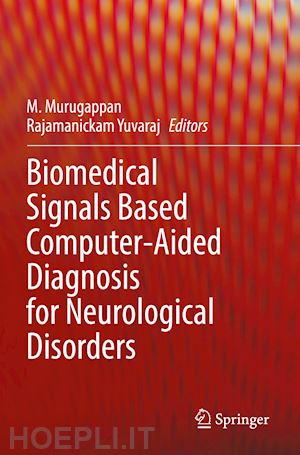
Questo prodotto usufruisce delle SPEDIZIONI GRATIS
selezionando l'opzione Corriere Veloce in fase di ordine.
Pagabile anche con Carta della cultura giovani e del merito, 18App Bonus Cultura e Carta del Docente
Biomedical signals provide unprecedented insight into abnormal or anomalous neurological conditions. The computer-aided diagnosis (CAD) system plays a key role in detecting neurological abnormalities and improving diagnosis and treatment consistency in medicine. This book covers different aspects of biomedical signals-based systems used in the automatic detection/identification of neurological disorders. Several biomedical signals are introduced and analyzed, including electroencephalogram (EEG), electrocardiogram (ECG), heart rate (HR), magnetoencephalogram (MEG), and electromyogram (EMG). It explains the role of the CAD system in processing biomedical signals and the application to neurological disorder diagnosis. The book provides the basics of biomedical signal processing, optimization methods, and machine learning/deep learning techniques used in designing CAD systems for neurological disorders.
1. Abnormal EEG detection using time-frequency images and convolutional neural network..- 2. Physical action categorization pertaining to certain neurological disorders using machine learning based signal analysis.- 3. A comparative study on EEG features for neonatal seizure detection..- 4. Hilbert huang transform (HHT) analysis of heart rate variability (HRV) in recognition of emotion in children with autism spectrum disorder (ASD).- 5. Detection of tonic-clonic seizures using scalp EEG of spectral moments..- 6. Investigation of the brain activation pattern of stroke patients and healthy individuals during happiness and sadness.- 7. A novel parametric non-stationary signal model for EEG signals and its application in epileptic seizure detection.- 8. Biomedical signal analysis using entropy measures: A case study of motor imaginary BCI in end-users with disability.- 9. Automatic detection of epilepsy using CNN-GRU hybrid model.- 10. Catalogic systematic literature review of hardware-accelerated neurodiagnostic.- 11. Wearable Real-time Epileptic Seizure Detection and Warning System.- 12. Analysis of Intramuscular Coherence of Lower Limb Muscles Activities using Magnitude Squared Coherence.
Dr. M. Murugappan is an Associate Professor in the Department of Electronics and Communication Engineering at Kuwait College of Science and Technology (KCST), Kuwait since 2016. He is also serving as a Visiting Professor in the School of Engineering at Vels Institute of Science, Technology, and Advanced Studies, India since Nov 2020. He received his M.E. in Applied Electronics from Anna University, India, and Ph.D. in Mechatronic Engineering from Universiti Malaysia Perlis, Malaysia, in 2006 and 2010, respectively. Prior to joining KCST, he was working as a Senior Lecturer in the School of Mechatronics Engineering, Universiti Malaysia Perlis, Malaysia from 2010 to 2016. He has received several research awards, medals, and certificates for excellent publications and research products, and was recently listed in a ranking of the top 2 percent of scientists in the world working in experimental psychology and artificial intelligence in a study by Stanford University for two consecutive years. He received more than $750K as research grants from Malaysia, Kuwait, and the United Kingdom for continuing his research in the field of affective computing. He has published more than 125 research peer-reviewed conference proceedings papers, journal articles, and book chapters. Many of his journal articles have received several awards such as best paper, best paper of the fiscal year, and so on. Dr. Murugappan serves on the editorial boards of PLOS ONE, Human Centric Information Sciences, Journal of Medical Imaging and Health Informatics, and International Journal of Cognitive Informatics. He is the Chair of Educational Activities in the IEEE Kuwait Section and is an active reviewer for many international journals including IEEE Transactions on Multimedia, IEEE Transactions on Affective Computing, IEEE Transactions on Health Informatics, and Biomedical Signal Processing and Control. His main research interests are affective computing, affective neuroscience, Internet of Things (IoT), Internet of Medical Things (IoMT), cognitive neuroscience, brain-computer interface, neuromarketing, neuroeconomics, medical image processing, machine learning, and artificial intelligence. He has a strong record of collaboration with leading researchers in the fields of biosignal/image processing, AI, IoT, and cognitive neuroscience over the globe. Dr. Murugappan is a member of several international professional societies such as the IEEE, IET, IACSIT, IAENG, and IEI.
Dr. Yuvaraj Rajamanickam is a research scientist at the National Institute of Education, Nanyang Technological University (NIE NTU), Singapore. He received both B.E. (Electronics and Communication Engineering) and M.E. degrees (Biomedical Engineering-Gold Medalist) from Anna University and his Ph.D. degree in Biomedical Electronics from University Malaysia Perlis (UniMAP). Before joining NIE, he was a Postdoctoral Research Fellow in the School of Electrical and Electronic Engineering at NTU and the Neural Systems Lab, Department of Biomedical Engineering at the University of Kentucky. His primary research interests are machine learning algorithms, with applications to biomedical signals analysis that include affective computing, brain-machine interface, and educational neuroscience. He has received several innovative research awards, medals, and certificates for excellent publications and research. He has published 25 research papers in refereed international journals and is the inventor of two patents. He serves as a reviewer for several international journals, including IEEE Transactions on Neural Systems and Rehabilitation Engineering, Neuroscience Letters, IEEE Journal of Biomedical and Health Informatics, and IEEE Transactions in Affective Computing. Furthermore, he is a member of the IEEE, Society for Neuroscience, Brain-Computer Interface Society, and Cognitive Neuroscience Society.










Il sito utilizza cookie ed altri strumenti di tracciamento che raccolgono informazioni dal dispositivo dell’utente. Oltre ai cookie tecnici ed analitici aggregati, strettamente necessari per il funzionamento di questo sito web, previo consenso dell’utente possono essere installati cookie di profilazione e marketing e cookie dei social media. Cliccando su “Accetto tutti i cookie” saranno attivate tutte le categorie di cookie. Per accettare solo deterninate categorie di cookie, cliccare invece su “Impostazioni cookie”. Chiudendo il banner o continuando a navigare saranno installati solo cookie tecnici. Per maggiori dettagli, consultare la Cookie Policy.